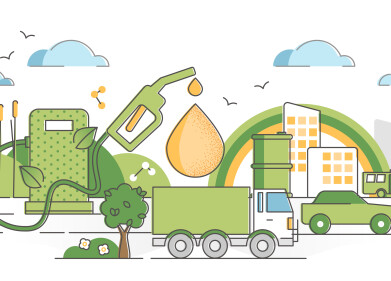Biofuel industry news
The good and the bad; is algae the future of biofuels?
Jul 31 2012
Algae has become a forerunner in the ever-expanding industry that is biofuels, and as more attention is turned to the tiny plant organisms, Peter Jones from the Scotsman has conducted a biofuel analysis discussing the pros and cons of adopting the renewable fuel.
A 2010 study by Southampton University and the Indian Institute of Petroleum researchers revealed that, in terms of production, algae produced biofuels were certainly leading the way. They found that corn is the least efficient producer of oil, yielding 70 litres per acre. Rapeseed does a little better, producing 480 litres per acre while the oil palm yields an impressive 2,400 litres.
However, algae is capable of producing, depending on the variety, between 23,500 and 55,000 litres of oil per acre. This is a significant advantage over other methods, particularly considering the strains on food production which can be caused by using natural produce such as corn. A warm summer in the US in 2012 has highlighted the shortfalls of this method of production.
The other big advantages of algae-produced biofuels is that they thrive on pollution. Most of the nutrients algae needs to grow and breed is nitrogen, potassium, and phosphorus. These can all come from sewage. Additionally, they need a lot of the pollutant carbon dioxide which can be pulled out of the atmosphere.
All this makes you wonder why we are not harvesting algae until our hearts (and cars) are content. But there are several downfalls to using the naturally produced plant organisms. One is that when algae grows fast, they don’t produce much oil. This means that all our efforts are now being centred into genetically modifying them to be fooled into producing more oil.
There is also a cost factor, with the American military recently finding that large quantities of algafuel cost between $133 and $425 per gallon, which is clearly ridiculously expensive. Some researchers believe they can do this for a scratch of that cost, but real results have yet to be seen.
Overall, the benefits of algae production will outweigh the costs, and it is likely to be only a matter of time before we see full-scale production.
Posted by Lauren Steadman
Digital Edition
PIN 25.6 Buyers' Guide
January 2025
Buyers' Guide Directory - Product Listings by Category - Suppliers Listings (A-Z) Articles Analytical Instrumentation - ASTM D7042: The Quantum Leap in Viscosity Testing Technology -...
View all digital editions
Events
Jan 22 2025 Tokyo, Japan
Jan 25 2025 San Diego, CA, USA
SPE Hydraulic Fracturing Technology Conference and Exhibition
Feb 04 2025 The Woodlands, TX, USA
Feb 05 2025 Guangzhou, China
Trinidad and Tobago Energy Conference 2025
Feb 10 2025 Point Lisas, Trinidad


















